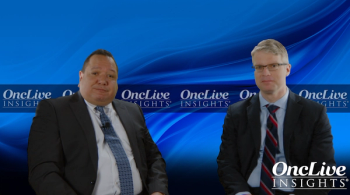
Phase 1 findings showed a 50% overall response rate among patients with EGFR-mutated non–small cell lung cancer who received amivantamab in combination with lazertinib plus carboplatin and pemetrexed.

Phase 1 findings showed a 50% overall response rate among patients with EGFR-mutated non–small cell lung cancer who received amivantamab in combination with lazertinib plus carboplatin and pemetrexed.

The FDA has approved trastuzumab deruxtecan for patients with HER2-mutated non–small cell lung cancer after the DESTINY-Lung02 results demonstrated a 57% overall response rate with the agent. The drug comes with warning for interstitial lung disease, neutropenia, and left ventricular dysfunction.

The FDA has granted capmatinib regular approval for patients with metastatic non–small cell lung cancer (NSCLC) whose tumors have a mutation leading to MET exon 14 skipping. The drug comes with warning for pneumonitis, hepatotoxicity, and pancreatic toxicity.

Patients with previously treated non–small cell lung cancer experienced a median overall survival of 16.9 months with second- or third-line tislelizumab vs 11.9 months with docetaxel.

The FDA has scheduled 3 sessions for the Oncologic Drugs Advisory Committee to review updates on the new drug application for poziotinib tablets and data for the continued approval of indications for melphalan flufenamide and duvelisib.

Beth Sandy, MSN, CRNP, discusses the application of 2 FDA approved drugs for patients with non–small cell lung cancer and an exon 20 insertion mutation.

At the 6th Annual SONO meeting, Beth Sandy, MSN, CRNP, reviewed available treatment options for patients with identified driver mutations in non–small cell lung cancer.

Faith Mutale, CRNP, discusses the paradigm shift needed in oncology to address clinical trial enrollment hesitancy among African American patients with lung cancer.

Beth Sandy, MSN, CRNP, discusses some of the challenges that may be associated with molecular testing, and how oncology nurses can help play a role in ensuring that the reports are received.

New data demonstrated the safety and efficacy of amivantamab-vmjw plus lazertinib and platinum-based chemotherapy in patients with relapsed or refractory, EGFR-mutant non–small cell lung cancer.

In early-stage cancers, ctDNA has a role in screening, neoadjuvant monitoring, identification of molecular residual disease (MRD), molecular relapse monitoring, and early assessment of treatment response.

Lidia Schapira, MD, FASCO, discusses the importance of rigorous baseline measurement in improving the assessment and management of distressful cancer symptoms.

Martin Dietrich, MD, PhD, and Edgardo Santos, MD, FACP, offer closing remarks on unmet needs and future directions in the management of CIM including other disease states where trilaciclib may offer myeloprotective benefit.

Focusing the discussion on the clinical trials that led to the FDA approval of trilaciclib, experts in ES-SCLC share key insights into the drug’s safety and its effect on patient quality of life.

Phase 3 findings from the AEGEAN trial demonstrated that adding durvalumab to platinum-based chemotherapy regimens improved pathologic complete response and major pathologic response among patients with resectable non–small cell lung cancer.

In this episode of The Vitals, Lidia Schapira, MD, FASCO, recounts highlights from the 2022 ASCO Symptoms and Survivorship track and underscores key takeaways for practitioners seeking to enhance the delivery of cancer survivorship care.

Renowned leaders in thoracic oncology discuss efficacy data from key clinical trials that led to the FDA approval of the CDK4/6 inhibitor trilaciclib for CIM prophylaxis in ES-SCLC, including the drug’s role in later treatment lines.

Edgardo Santos, MD, FACP, and Martin Dietrich, MD, PhD, share insights into the mechanism of action of CDK4/6 inhibitors for the prevention of myelosuppression in ES-SCLC.

Expert panelists review considerations in the prophylactic treatment of chemotherapy-induced myelosuppression with special attention paid to unmet needs related to the use of G-CSF and ESAs.

Two leaders in the management of ES-SCLC provide an overview of chemotherapy-induced myelosuppression including key risk factors and its effect on patient outcomes.

The expansion of screening criteria is an important step in decreasing lung cancer screening disparities in high-risk populations. Efforts to expand community outreach, overcome logistical barriers, and facilitate screening adherence must still be made, experts say.

The intracranial objective response rate was 32% among patients with KRAS G12C–mutant, non–small cell lung cancer who received adagrasib.

Aliènne Salleroli, MS, BSN, RN, OCN, underscores the importance of open dialogue surrounding diversity, equity, and inclusion in oncology leadership.

Regardless of other identified driver genomic alterations, patients with heavily pretreated, advanced, non–small cell lung cancer achieved encouraging responses with patritumab deruxtecan.

Frontline nivolumab and ipilimumab combination therapy was associated with increased 5-year survivorship in patients with metastatic non–small cell lung cancer—regardless of PD-L1 expression.